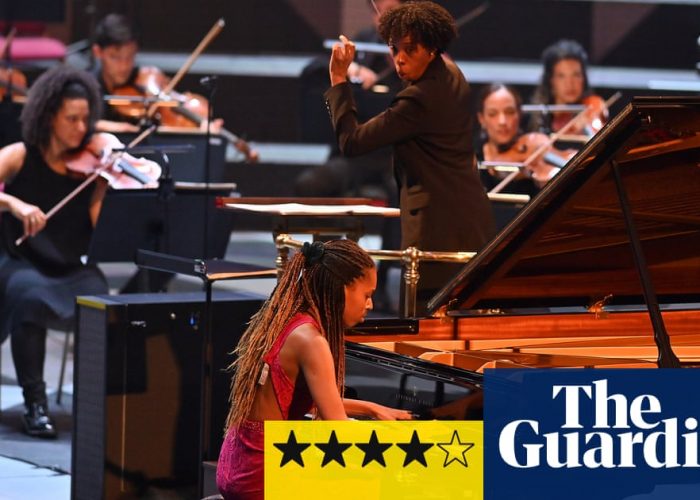The audience was small but the roars of welcome for the UKs only Black and ethnically diverse orchestra could not have been more enthusiastic. Fresh from the Edinburgh international festival see their performance onlineChineke! returned to the Royal Albert Hall last Tuesday, conducted by the Panamanian-American Kalena Bovell: their fourth BBC Proms appearance, her first. In a programme of music by composers of African ancestry, all but one of the works was new to the Proms. This is an orchestra dedicated to expanding the repertoire.
The novelty, after Fela Sowandes wide-ranging African Suite (1944), was Florence Prices Piano Concerto in One Movement (1934). Lost for several years, reconstructed by devoted hands in 2010, it is at last reaching a wider audience. With a deft and expressive soloist in 19-year-old Jeneba Kanneh-Mason (who, with her six siblings, is back at the Proms on Sunday for The Carnival of the Animals), the work seemed to grow beyond the sum of its parts. An impassioned opening section, with a virtuosic cadenza and a soaring melody riding the crest of the orchestra, is the most adventurous. The middle section, drawing lyrically on an African American spiritual, and the jazzy juba-dance finale have less muscle, but joyful charm. Kanneh-Mason, still a student at the Royal College of Music, then played an evocative encore: the Impromptu in B minor by a fellow RCM alumnus, Samuel Coleridge-Taylor (1875-1912).
The overture to his popular choral work The Song of Hiawatha, last heard at the Proms in 1959, had opened the programme. His youthful Symphony in A minor (1896, rev 1900, 1901) ended it. Hearing this exuberant if occasionally uneven work, which never quite satisfied Coleridge-Taylor himself, is a reminder of this composers bristling originality, all the more poignant given his early death, aged 37. Over the six years of its existence, Chineke! has brought him back to public consciousness (as well as putting Croydon, where he grew up, on the musical map). The orchestra has raised its game technically, and standards are impressive, though on Tuesday some ensemble and tuning fluffs might have been ironed out by a firmer steer from the conductor. As listeners we are also imperfect, sometimes noticing one section, one player, to the exclusion of others. For me in this case it was the violas, prominent and busy in both the Price and the Coleridge-Taylor, and the principal clarinet, whose sensational playing stood out from the crowd.
The question for everyone mounting concerts and operas (or any public event) in the pandemic has been whether to wait for it all to be over or to find a solution until it is. As clarity recedes, action becomes the only way, easier for small venues than for an enormous juggernaut the size of the Proms. The Arcola theatre in Dalston, east London, has just opened a fine new outdoor performance space. A cross between big top and warehouse, it has been created by the stage designer Jon Bausor, whose work includes the London 2012 Paralympics opening ceremony, and who incidentally also trained as a musician. The acoustic proved warm and supportive for Handels Alcina, performed in a cut-down but thrilling version by Ensemble OrQuesta, directed by Marcio da Silva.
Outstanding: Laura Fleur, left, with Kieran White in Alcina. Photograph: Andreas Grieger
Once you had adjusted to the balance of powerful voices and a small instrumental ensemble seven versatile players Handels opera seria, written for London in 1735, held you in its grip. Its the one about two sorceresses, a flying horse (OK, hippogriff), multiple lovers in multiple disguises, a bush that talks and yes, I give up too. Lets blame Ariosto, whose poem Orlando Furioso is the source. This production, simply staged, was set in an office where, indeed, odd things can happen.
More important, the work is packed with dazzling arias, many sung by Alcina, a role recently made famous by Joyce DiDonato and Cecilia Bartoli but here superbly sung (in the first of two casts) by Helen May, with Laura Fleur outstanding as the knight, Ruggiero. In a top quality cast, Poppy Shotts calls for special mention in the small role of Oberto, a boy who has lost his father, who, in the way of things, is now a lion. Handel apparently added the showstopping aria, for boy treble, at the last moment to highlight a newfound talent. If it worked then, it worked now too. Alcina is part of this years Grimeborn (running to 11 September). Catch anything in this singular festival if you can.
Star ratings (out of five)Chineke! Orchestra Alcinaread more
The week in classical: Chineke! Orchestra; Alcina – review


